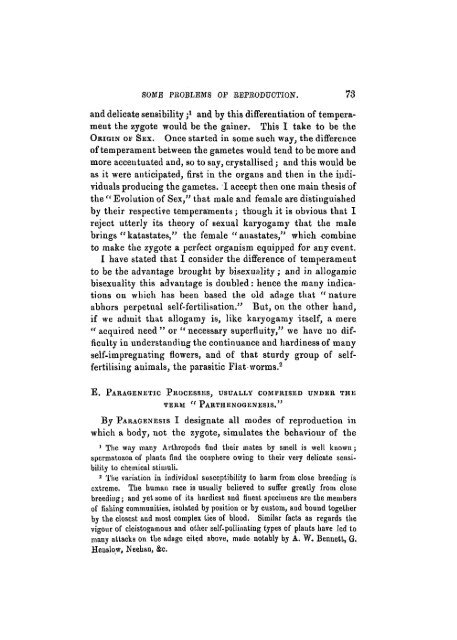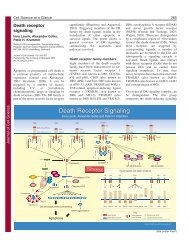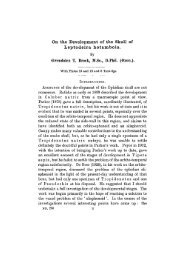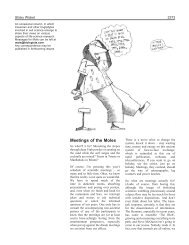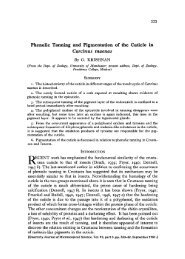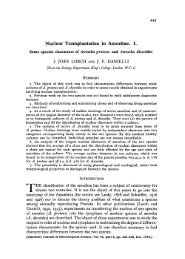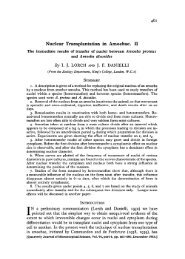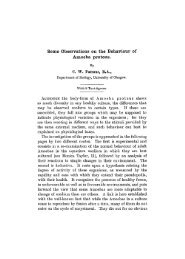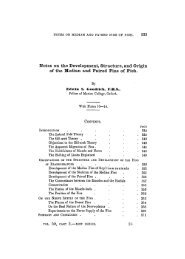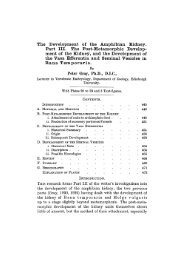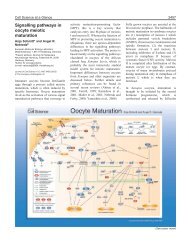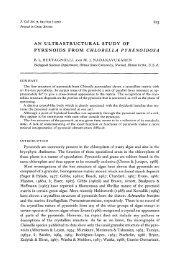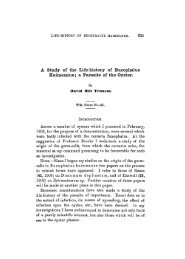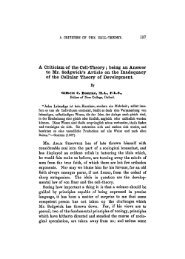Some Problems of Reproduction: a Comparative Study of ...
Some Problems of Reproduction: a Comparative Study of ...
Some Problems of Reproduction: a Comparative Study of ...
You also want an ePaper? Increase the reach of your titles
YUMPU automatically turns print PDFs into web optimized ePapers that Google loves.
SOME PEOBLEMS OF REPRODUCTION. 73<br />
and delicate sensibility j 1 and by this differentiation <strong>of</strong> temperament<br />
the zygote would be the gainer. This I take to be the<br />
ORIGIN 01? SEX. Once started in some such way, the difference<br />
<strong>of</strong> temperament between the gametes would tend to be more and<br />
more accentuated and, so to say, crystallised; and this would be<br />
as it were anticipated, first in the organs and then in the individuals<br />
producing the gametes. I accept then one main thesis' <strong>of</strong><br />
the " Evolution <strong>of</strong> Sex," that male and female are distinguished<br />
by their respective temperaments; though it is obvious that I<br />
reject utterly its theory <strong>of</strong> sexual karyogamy that the male<br />
brings " katastates," the female " anastates," which combine<br />
to make the zygote a perfect organism equipped for any event.<br />
I have stated that I consider the difference <strong>of</strong> temperament<br />
to be the advantage brought by bisexuality; and in allogamic<br />
bisexuality this advantage is doubled: hence the many indications<br />
on which has been based the old adage that " nature<br />
abhors perpetual self-fertilisation." But, on the other hand,<br />
if we admit that allogamy is, like karyogamy itself, a mere<br />
" acquired need " or " necessary superfluity," we have no difficulty<br />
in understanding the continuance and hardiness <strong>of</strong> many<br />
self-impregnating flowers, and <strong>of</strong> that sturdy group <strong>of</strong> selffertilising<br />
animals, the parasitic Flat worms. 2<br />
E. PARAGENETIC PROCESSES, USUALLY COMPRISED UNDER THE<br />
TERM " PARTHENOGENESIS."<br />
By PARACSENESIS I designate all modes <strong>of</strong> reproduction in<br />
which a body, not the zygote, simulates the behaviour <strong>of</strong> the<br />
1 The way many Arthropods find their mates by smell is well known;<br />
spermatozoa <strong>of</strong> plants find the oosphere owing to their very delicate sensibility<br />
to chemical stimuli.<br />
1 The variation in individual susceptibility to harm from close breeding is<br />
extreme. The human race is usually believed to suffer greatly from close<br />
breeding; and yet some <strong>of</strong> its hardiest and finest specimens are the members<br />
<strong>of</strong> fishing communities, isolated by position or by custom, and bound togetlier<br />
by the closest and most complex ties <strong>of</strong> blood. Similar facts as regards the<br />
vigour <strong>of</strong> cleistogamous and other self-pollinating types <strong>of</strong> plants have led to<br />
many attacks On the adage cited above, made notably by A. W. Bennett, G.<br />
Henslow, Neehan, &c.


